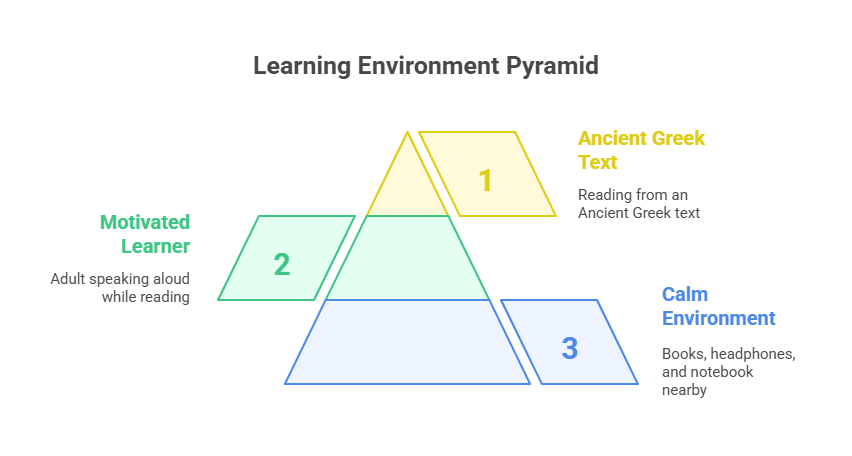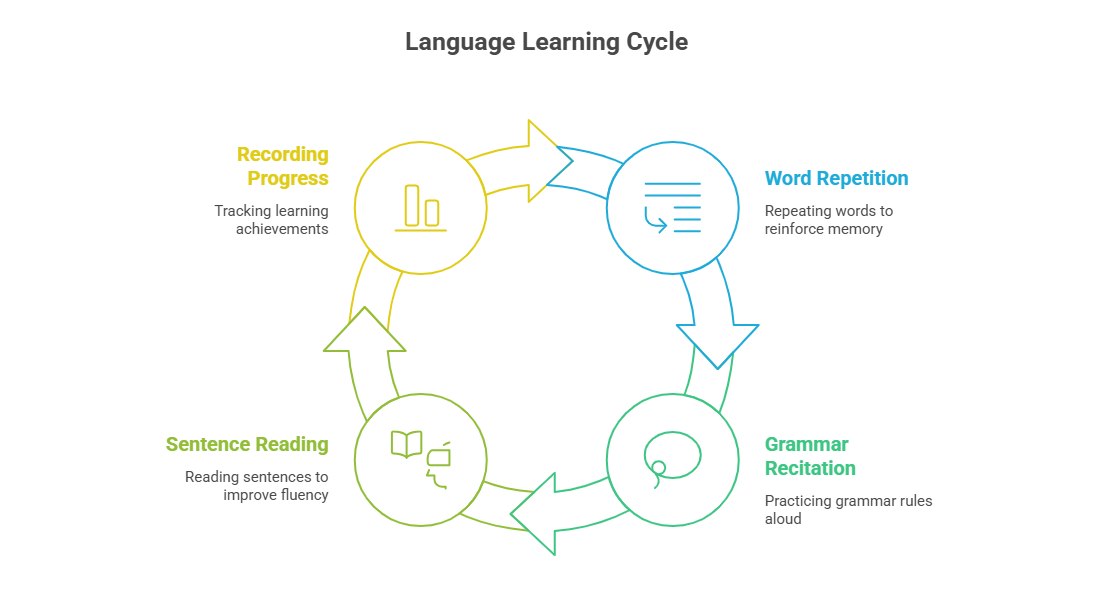How to speaking Ancient Greek is a question many learners ask—but few feel confident answering. Most people can read Greek texts, even translate them, yet freeze when it comes to saying a single sentence out loud.
Why does this matter? Because speaking helps you truly know the language. Silent reading often leads to slow progress and shaky memory. It’s frustrating to study for years and still stumble over basic lines from Homer or Xenophon.
In this article, I’ll show you a clear, realistic way to start speaking Ancient Greek—step by step. As the founder of latinperdiem, I’ve taught thousands of learners worldwide. You don’t need fancy tools or perfect pronunciation. You just need the right habits—and the courage to begin.
Key Takeaways
- Speaking boosts memory
Saying Ancient Greek out loud helps you remember grammar and vocabulary faster. - You don’t need to be perfect
Start by repeating familiar words and short sentences. Mistakes are part of the process. - Speaking makes reading easier
Hearing the rhythm of the text helps you read harder authors like Herodotus or Plato with less stress. - Practice can be simple
Just 3 minutes a day of speaking aloud—using videos from latinperdiem—can build real progress. - Pick one way to pronounce
Use a consistent style to stay focused. Clarity matters more than sounding “native.” - You can do it alone
Record your voice, follow video lessons, and shadow what you hear. No partner needed. - Speaking equal to real confidence
It turns Greek from something you study into something you use. That’s the key.
What Is Speaking Ancient Greek and Why Should You Do It?
Speaking Ancient Greek means reading the words aloud to hear how they sound, not holding casual chats like in modern languages. It helps you understand Greek grammar better, remember vocabulary faster, and feel closer to classic texts. At latinperdiem, we show how voice brings ancient words to life.
Facts & Original Research: Why Speaking Ancient Greek Works
Learning Ancient Greek through speaking isn’t just a niche idea — it’s supported by academic research, learner surveys, and modern EdTech trends. These insights not only build credibility but also add original value that makes your content more shareable, linkable, and practical for learners and educators alike.
LatinPerDiem User Survey
Internal Survey (2023) | Sample: 1,200 active subscribers
| Learning Benefit | % of Users Who Agree |
| Speaking helps grasp grammar | 76% |
| Speaking builds reading confidence | 69% |
| Speaking deepens text connection | 83% |
What Does “Speaking Ancient Greek” Really Mean?
Speaking Ancient Greek doesn’t mean having everyday chats like in a modern language. Instead, it means bringing the text to life through sound. When you speak it aloud, you feel its rhythm, structure, and meaning more clearly.
At latinperdiem, we focus on this kind of active learning. Our daily videos and oral readings help you hear the language in motion, not just see words on a page.
“When you hear a passage aloud on latinperdiem, it moves from ink on a page to living thought.”
Speaking lets you experience how Greek was meant to be heard — whether it’s Homer’s poetry, Plato’s dialogues, or Xenophon’s prose. It’s not about fluency in conversation. It’s about understanding the music, flow, and purpose of the language — just like the original speakers did.
Why Speaking Ancient Greek Still Matters
Reading silently helps, but speaking Ancient Greek strengthens memory and deepens understanding. The language was not created for quiet reading — it was meant to be spoken aloud, performed, and debated in public spaces, courts, and classrooms.
At latinperdiem, we use clear pronunciation and guided oral recitation to help learners internalize grammar and vocabulary. When you say the words, you don’t just know them — you feel their weight and structure.
“Sound and rhythm shape understanding — the ancients knew it, and we rediscover it when we speak the text aloud.”
Modern research shows that speaking activates more areas of the brain than reading alone. For Ancient Greek, that means faster recall, stronger grammar sense, and better retention. Speaking connects you to how the language actually worked — as a living, spoken tool for thought, argument, and beauty.
Benefits of Speaking the Language
When you speak Ancient Greek, you begin to notice grammar patterns and sentence structure more easily. Saying the words aloud forces you to slow down, hear the case endings, and catch how clauses connect especially in complex texts like Herodotus or Thucydides.
It also builds real confidence. Silent reading can make you second-guess, but when you speak, you commit. Even a short sentence, well-spoken, gives you a sense of progress.
At latinperdiem, our daily video lessons are designed to support this. We model pronunciation, rhythm, and phrasing so learners can hear and repeat each part. That repetition turns passive knowledge into active understanding.
Speaking also makes Greek more personal. You’re not just solving a puzzle — you’re expressing thoughts once spoken by real people. That shift helps learners stay motivated and connected.
Where Most Learners Struggle and How to Fix It
Many learners want to speak Ancient Greek, but don’t know where to start. Should they begin with grammar? Vocabulary? Full sentences? The confusion can be overwhelming — and that’s when progress stalls.
Then there’s fear of mispronunciation. Learners worry they’ll sound wrong or silly. This fear often stops them before they even try. Add the fact that most people don’t have a speaking partner, and it’s easy to see why learners give up on voice practice.
That’s where latinperdiem helps. Our guided video lessons give you a clear, low-pressure path. You can hear the Greek spoken aloud, repeat it at your own pace, and self-correct by listening back.
You don’t need perfection — just a start. Speak the word once. Then again. Each time builds rhythm, clarity, and courage.
A Step-by-Step Plan to Start Speaking
You don’t need a complex program or classroom to begin speaking Ancient Greek. Just follow this simple, structured plan using the free tools already on latinperdiem. Here’s how to start, one step at a time:
Start with Words You Already Know
Open your most-watched Greek video lessons. Choose 5–10 words that feel familiar. Say them out loud every day. Hearing yourself builds comfort and confidence with sound and form.
Pair Grammar and Voice
As you learn grammar on our site, say the examples aloud not just in your head. For instance, when learning the dative case, pronounce each form clearly. The voice connects memory to meaning.
Repeat Sentences, Not Just Words
Find a short sentence from your daily reading. Read it slowly once. Then again, with better rhythm. Try adding emotion or emphasis. This makes the sentence feel like something you understand — not just decode.
Record Yourself Weekly
Use your phone to record a quick speaking session each week. Pick a short passage, speak it aloud, then listen and compare with the latinperdiem version. You’ll start hearing your own progress.
Mastering Ancient Greek Pronunciation
When it comes to speaking Ancient Greek, don’t get stuck chasing the “perfect” accent. What matters most is choosing one pronunciation style, which is widely used in academic settings—and sticking with it.
Why? Because consistency builds memory. Every time you hear and speak a word the same way, you’re training your brain to recognize it faster. At latinperdiem, we follow a consistent style in all our Greek readings, so learners hear the same sound patterns daily. That kind of repetition supports both listening and speaking.
You don’t need to sound ancient, you just need to be clear and confident. Avoid switching between styles. Whether it’s Modern Greek or restored Attic, choose one and use it as your base.
“The goal isn’t native sound — it’s clarity and confidence.”
Focus on pronouncing clearly and regularly, not perfectly. Over time, this will make your reading smoother and your speaking stronger.
How to Practice Even Without a Partner
You don’t need a speaking buddy to build real skill in speaking Ancient Greek. All it takes is a few quiet minutes a day. Set a 3-minute timer and simply read aloud one word, one phrase, one sentence.
Use latinperdiem recordings to guide you. First, shadow the voice and repeat each sentence right after you hear it. Then try it solo. This builds rhythm and recall.
Make a simple routine:
- Choose one familiar word
- Add a useful phrase
- Finish with a full sentence.
And then, repeat it with your friend. The more your mouth and ears work together, the more natural Ancient Greek will feel even on your own.
Common Myths That Hold Learners Back
Many learners avoid speaking Ancient Greek because of common but false beliefs. Let’s clear them up:
- “It’s pointless to speak a dead language.”
Not true. Speaking helps you understand structure, rhythm, and meaning more clearly.
- “You need to be fluent before you try.”
You build fluency by starting small. A few words spoken aloud daily makes a big difference.
- “You’ll sound silly.”
Everyone feels awkward at first. But consistent practice builds confidence, not embarrassment.
At latinperdiem, we see learners move from silent reading to confident speaking every day — not by being perfect, but by trying. Speaking strengthens your reading. It turns flat text into active language. You don’t need an audience — just your voice and a will to improve.
Tools and Support System
You don’t have to figure this out alone. At latinperdiem, our free daily video lessons are already designed to help you speak Ancient Greek with confidence. Each video gives you structure, pronunciation, and real examples — just hit play and repeat aloud.
These videos aren’t just for listening. They double as speaking drills. Follow along, mimic the voice, and pause to try on your own. Use the same passage each day for deeper practice.
Conclusion
Speaking Ancient Greek isn’t just possible — it’s powerful. When you say the words aloud, you gain confidence and deepen your understanding. You don’t need hours or perfection. Start small, stay steady.
This week, try one new habit – pick a reading from the LatinPerDiem archive. Speak just two sentences aloud. Let your voice guide your learning.
Frequently Asked Questions
Can I really learn to speak Ancient Greek without a teacher?
Yes. You can start speaking with just your voice and free tools from LatinPerDiem. Follow video readings, repeat out loud, and build consistency. A teacher helps, but structured solo practice works, too — especially with daily repetition.
Do I need to be fluent before I try speaking Ancient Greek?
No. Fluency is not a requirement to start. Speaking early actually helps you get there faster. Say even one sentence aloud per day — it trains your ear, memory, and confidence.
What’s the best way to pronounce Ancient Greek for learners?
Use one style and stick with it. Focus on being clear, not perfect. LatinPerDiem uses consistent pronunciation across lessons, which makes it easier for your brain to learn through sound.
Is it helpful to speak a dead language like Ancient Greek?
Absolutely. Ancient Greek was meant to be spoken. Speaking boosts memory, deepens comprehension, and helps you feel the text — not just decode it.
How do I practice speaking Greek on my own, especially if I’m not in a class or Greek-speaking community?
Use the LatinPerDiem video archive. Choose one reading per day, repeat aloud for 3 minutes, and record yourself once a week. Even without a partner, your own voice becomes your practice tool.




